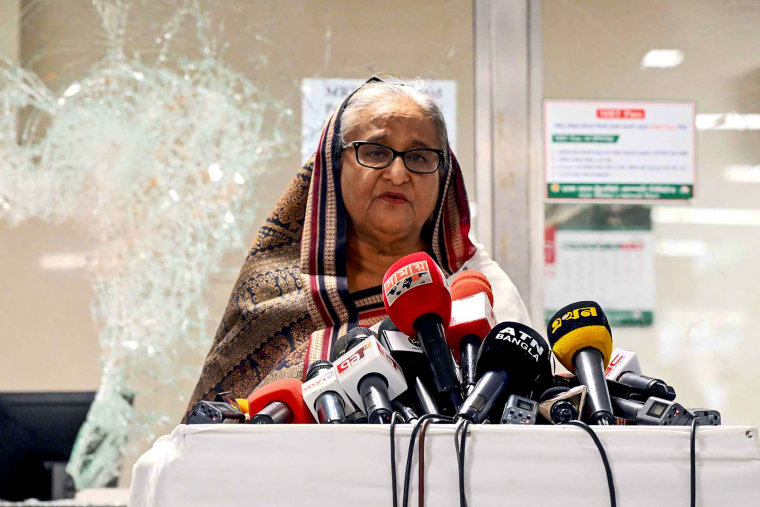Bangladesh prime minister is ousted after weeks of deadly protests
DHAKA, Bangladesh — Bangladesh Prime Minister Sheikh Hasina resigned and left the country on Monday, the army chief said, a day after nearly 100 people were killed in clashes with the police as protesters demanded she step down.
In an address to the nation, army chief Gen. Waker-Uz-Zaman said an interim government would be formed.
The ouster of Hasina, 76, Bangladesh’s longest-serving leader, is a seismic change for the South Asian nation of 170 million people, where at least 300 people have been killed in recent weeks amid a mass movement against what critics said was her increasingly autocratic rule.
Video showed protesters carrying clothes and furniture out of the prime minister’s residence in Dhaka, the capital, which had been left unguarded.
Hasina’s resignation was met with jubilance by people gathered on the streets.
“I can’t express how it feels in words. This is perhaps the best day of my life,” said Saqlain Rafi, a high school student who was out with his father in the Bangla Motor area of Dhaka, where the procession of people reached as far as the eye could see.
“I could not fight on the street for the fall of this tyrant,” he added. “All hail the 300 martyrs who died for our future.”

At least 95 people, including 14 police officers, were killed on Sunday in the deadliest day of protests that began in June, according to the country’s leading Bengali-language daily newspaper, Prothom Alo.
Officials responded Sunday evening by imposing an indefinite nationwide curfew. But student-led protesters had called for a march toward the capital that drew people from around the country in an effort to press Hasina to to resign.
The country also spent most of Monday under an internet blackout ahead of Zaman’s address.
On Sunday, tens of thousands of people took to the streets across the country demanding that Hasina step down, and were met with police officers who responded with tear gas and rubber bullets. Cars and buildings were set ablaze as protesters clashed with groups they said were associated with the government.
“When you’re on the streets and you look around and see thousands of people of your age, your father’s age, your sister’s age, you feel invincible,” Monorom Polok, 25, said in a telephone interview from Dhaka as he prepared to join the march on Monday.
Sunday’s death toll was the highest since the protests began over a controversial preferential quota system for public sector jobs. While they began peacefully, they evolved into fury against Hasina over the violent crackdown, which in addition to more than 300 deaths left thousands of people injured.
“The shocking violence in Bangladesh must stop,” Volker Türk, the U.N. High Commissioner for Human Rights, said in a statement Sunday.





